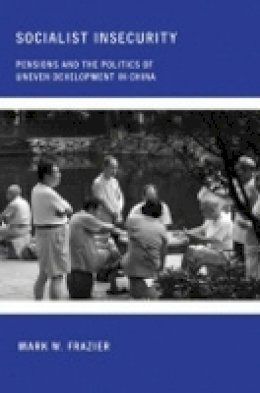
Socialist Insecurity: Pensions and the Politics of Uneven Development in China
Mark W. Frazier
Over the past two decades, China has rapidly increased its spending on its public pension programs, to the point that pension funding is one of the government's largest expenditures. Despite this, only about fifty million citizens—one-third of the country's population above the age of sixty—receive pensions. Combined with the growing and increasingly violent unrest over inequalities brought about by China's reform model, the escalating costs of an aging society have brought the Chinese political leadership to a critical juncture in its economic and social policies.
In Socialist Insecurity, Mark W. Frazier explores pension policy in the People's Republic of China, arguing that the government's push to expand pension and health insurance coverage to urban residents and rural migrants has not reduced, but rather reproduced, economic inequalities. He explains this apparent paradox by analyzing the decisions of the political actors responsible for pension reform: urban officials and state-owned enterprise managers. Frazier shows that China's highly decentralized pension administration both encourages the "grabbing hand" of local officials to collect large amounts of pension and other social insurance revenue and compels redistribution of these revenues to urban pensioners, a crucial political constituency.
More broadly, Socialist Insecurity shows that the inequalities of welfare policy put China in the same quandary as other large uneven developers—countries that have succeeded in achieving rapid growth but with growing economic inequalities. While most explanations of the formation and expansion of welfare states are derived from experience in today's mature welfare systems, developing countries such as China, Frazier argues, provide new terrain to explore how welfare programs evolve, who drives the process, and who sees the greatest benefit.
Product Details
About Mark W. Frazier
Reviews for Socialist Insecurity: Pensions and the Politics of Uneven Development in China
Daniel Beland
Journal of Asian Studies
By examining the way social security policies have heightened [income] inequalities and contributed to a process of uneven development in China, Frazier has made a major contribution to understanding the issues. His account also has relevance for the formulation of policies that can resolve the problem.... Its central theme will be of particular interest to those working in the fields of social policy and social development in the Global South.
James Midgley
Journal of Social Policy
This book explores the background to the Chinese pensions problem... [where] millions are without pensions or indeed any other kind of welfare support; the pension funds that do exist have billions badly invested by local officials, and the rural areas are paying benefits which they have no funds to support..... The book looks at all these concerns and many others as well... above all looks at the public policy issues that are both frustrating and driving change.... The conclusion of this lucid and valuable study is that China, rather like western government, faces a crucial choice about how to rebalance an economy whose rapid growth has thus far been based on high savings, low consumption and limited public welfare provision into the twenty-first century when all of these are likely to change.
Robin Ellison
Pensions
This book is very comprehensive and informative and will certainly open readers' eyes by focusing on two of the most serious issues in China, namely pensions and politics. It provides a detailed analysis of the tense relationship between China's social, economic and political complexities and its fragmented pension system.
Stuart H. Leckie
Journal of Pension Economics and Finance
